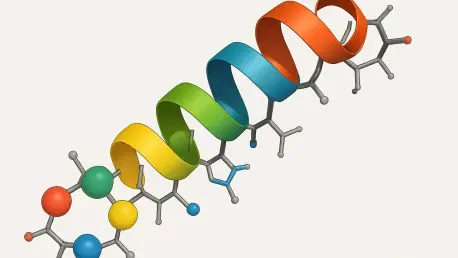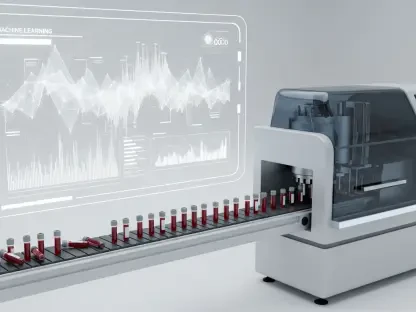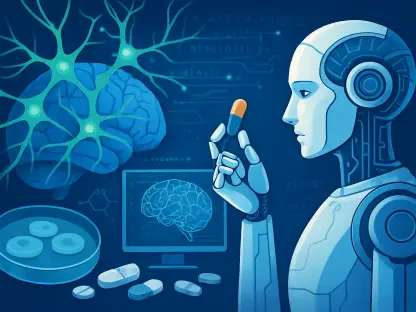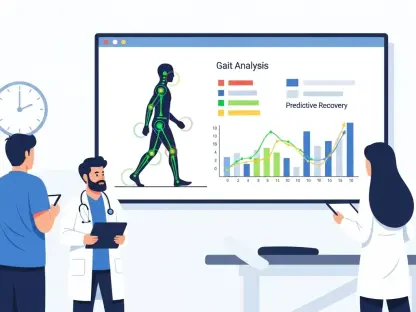The relentless battle against cancer continues to drive scientific innovation, with researchers exploring every possible avenue to develop treatments that can effectively target cancer cells while sparing healthy tissues from harm. One particularly promising approach involves anticancer peptides (ACPs), which are short chains of amino acids capable of selectively attacking cancer cells with minimal side effects compared to conventional therapies like chemotherapy. Yet, the journey to identify and refine these peptides has been riddled with obstacles, including the immense time and financial resources required to navigate the vast complexity of peptide sequences and their biological interactions. Artificial intelligence (AI) emerges as a potential game-changer in this arena, offering tools that could dramatically speed up the discovery process. Recent advancements, such as the ACP-EPC framework, showcase how deep learning and sophisticated data analysis might transform the landscape of cancer research by predicting effective ACPs with unprecedented accuracy and efficiency, raising the question of whether AI could truly redefine this critical field.
Navigating the Hurdles of Peptide-Based Cancer Therapies
Breaking Down the Barriers of Traditional Methods
The conventional process of discovering anticancer peptides has long been a laborious and expensive endeavor, often stretching over many years and demanding significant funding for experimental trials. These traditional methods typically rely on a trial-and-error approach, testing countless peptide combinations in the lab to find those with potential anticancer properties. Such inefficiency becomes even more problematic given the urgent need for new therapies as resistance to existing treatments like chemotherapy grows. The slow pace of discovery not only delays the availability of novel solutions but also inflates costs, limiting accessibility for many patients. AI steps in as a powerful alternative, automating the initial stages of peptide identification and slashing both time and resource demands. By simulating and predicting peptide behavior through computational models, this technology offers a pathway to bypass much of the grunt work, allowing researchers to focus on validating the most promising candidates.
Moreover, the integration of AI into this field addresses a critical gap in scalability that traditional methods cannot overcome. Where manual experimentation might explore only a fraction of possible peptide sequences due to practical constraints, AI systems can analyze vast datasets in a fraction of the time, identifying patterns and possibilities that might otherwise remain hidden. This capability is especially vital in an era where cancer treatment must evolve rapidly to keep up with diverse patient needs and emerging resistance mechanisms. The potential to streamline the discovery pipeline through AI-driven insights could fundamentally alter how quickly new therapies reach clinical application. As computational tools continue to improve, they promise to make the search for effective ACPs not just faster, but also more systematic and data-driven, potentially reshaping the economics and accessibility of cancer care on a global scale.
Addressing the Complexity of Peptide Interactions
Beyond the sheer volume of time and cost, the intricate nature of peptide interactions with cancer cells poses another formidable challenge in traditional discovery methods. Peptides must be meticulously designed to target specific cellular mechanisms without triggering unintended effects, a process complicated by the vast array of biological variables at play. Historically, understanding these interactions has required extensive lab-based studies, often yielding incomplete insights due to the limitations of experimental scope. AI offers a transformative approach by modeling these complex interactions digitally, using algorithms to predict how peptides might behave in biological systems. This predictive power helps narrow down the field of candidates before any physical testing begins, saving valuable resources and focusing efforts on the most likely successes.
Additionally, AI’s ability to handle multidimensional data adds a layer of depth to the analysis of peptide interactions that was previously unattainable. Advanced frameworks can integrate information about chemical properties, structural configurations, and biological functions to build a comprehensive picture of a peptide’s potential effectiveness. This holistic perspective is crucial for overcoming the unpredictability that often derails traditional research efforts. By providing a clearer understanding of why certain peptides might work better than others, AI not only accelerates the discovery process but also enhances the precision of subsequent experimental validations. This shift toward a more informed and targeted approach could mark a significant departure from the guesswork that has long characterized peptide research, paving the way for more reliable and effective cancer therapies.
AI as a Transformative Force in Peptide Prediction
Leveraging Deep Learning for Enhanced Accuracy
Artificial intelligence, through cutting-edge frameworks like ACP-EPC, is redefining the precision with which potential anticancer peptides are identified. By employing deep learning techniques and pre-trained protein language models, these systems excel at detecting subtle patterns within peptide sequences that traditional bioinformatics tools might overlook. This heightened accuracy stems from AI’s capacity to learn from vast datasets of protein information, enabling it to predict which sequences are most likely to exhibit anticancer properties. Such precision is a critical advancement, as it allows researchers to prioritize the most promising candidates for lab testing, thereby increasing the likelihood of successful outcomes. The shift from broad, unguided experimentation to targeted, data-driven predictions represents a significant leap forward in the efficiency of drug discovery.
Furthermore, the application of deep learning in this context goes beyond mere prediction to offer insights into the underlying characteristics of effective peptides. AI models can analyze historical data to uncover trends and correlations that inform future research directions, providing a roadmap for scientists to follow. This analytical depth is particularly valuable in a field where the stakes are high, and every failed experiment translates to lost time and resources. By reducing the margin of error in the early stages of peptide selection, AI ensures that subsequent efforts are concentrated on high-potential options. As these technologies continue to evolve, their ability to refine predictions will likely become even more sophisticated, potentially setting a new benchmark for how cancer research is conducted and accelerating the path from concept to clinical application.
Multi-View Analysis for a Holistic Perspective
A standout feature of modern AI frameworks in anticancer peptide prediction is their use of multi-view feature extraction, which assesses peptides from various angles to ensure a comprehensive evaluation. This approach considers diverse aspects such as chemical composition, structural attributes, and biological functionalities, painting a fuller picture of a peptide’s potential effectiveness against cancer cells. Unlike single-dimensional analyses that might miss critical factors, this method captures the intricate interplay of traits that contribute to a peptide’s success. The result is a more robust prediction model that accounts for the complexity of biological systems, enhancing the reliability of the outcomes and providing researchers with a clearer direction for experimental follow-up.
In addition, the multi-view strategy addresses one of the longstanding limitations of peptide research: the difficulty of understanding how different properties interact to produce a therapeutic effect. By integrating multiple data streams into a cohesive analysis, AI helps uncover hidden relationships that might be pivotal to a peptide’s performance. This nuanced understanding is essential for designing peptides that are not only effective but also safe for clinical use, as it minimizes the risk of overlooking adverse interactions. The adoption of such comprehensive techniques signals a maturing of AI’s role in biomedical research, moving beyond basic pattern recognition to offer actionable insights. As these models are refined further, they could become indispensable tools in the quest to develop next-generation cancer therapies tailored to specific challenges.
Building Trust Through Model Transparency
Transparency in AI models is a cornerstone of their acceptance in biomedical research, where understanding the rationale behind predictions is as important as the predictions themselves. Many conventional AI systems operate as opaque “black boxes,” leaving scientists puzzled about how conclusions are reached, which can erode confidence in their application. In contrast, frameworks like ACP-EPC are engineered with interpretability in mind, allowing researchers to see the specific features and data points driving each prediction. This clarity is invaluable for guiding experimental design, as it provides a logical basis for why certain peptides are flagged as promising. Such transparency fosters trust among scientists and clinicians, ensuring that AI tools are viewed as reliable partners in the research process.
Equally important is the role of interpretability in bridging the gap between computational predictions and real-world medical applications. When researchers can dissect the reasoning behind an AI model’s output, they are better equipped to design validation studies that test specific hypotheses, thereby streamlining the transition from theory to practice. This openness also encourages collaboration across disciplines, as it demystifies AI for those who might otherwise be skeptical of its utility in healthcare. By prioritizing transparency, these advanced models not only enhance the credibility of their predictions but also contribute to a broader cultural shift toward accountability in scientific innovation. As trust in AI grows, its integration into critical areas like cancer research is likely to deepen, potentially transforming how new therapies are conceptualized and developed.
Envisioning a New Era in Cancer Treatment
Speeding Up the Path to New Therapies
One of the most profound impacts of AI in anticancer peptide prediction lies in its ability to drastically shorten the drug development timeline, a process that traditionally spans over a decade and consumes billions of dollars. By automating the identification of potential ACPs, AI eliminates much of the guesswork and inefficiency inherent in conventional approaches, enabling researchers to focus on validating a smaller, more targeted pool of candidates. This acceleration is not merely a matter of convenience; it represents a lifeline for patients awaiting innovative treatments, particularly as the global burden of cancer continues to rise. Lowering the time and cost barriers also has the potential to make cutting-edge therapies more accessible, addressing disparities in healthcare access that often leave many without viable options.
Beyond the immediate benefits of speed, the cost reductions enabled by AI could democratize the field of cancer research itself, allowing smaller institutions and developing regions to participate in drug discovery efforts. This broader participation might lead to a more diverse range of therapeutic solutions, as different perspectives and priorities come into play. Additionally, the efficiency gains from AI-driven predictions could encourage investment in high-risk, high-reward projects that might otherwise be deemed too resource-intensive. The ripple effects of such changes could reshape the economics of oncology, making it feasible to pursue novel treatments that were once out of reach. As AI continues to optimize the early stages of drug development, it sets the stage for a future where the pace of innovation matches the urgency of patient needs.
Advancing the Vision of Personalized Medicine
The rise of personalized medicine, where treatments are customized to an individual’s unique genetic and clinical profile, finds a powerful ally in AI-driven anticancer peptide prediction. By identifying peptides with specific properties tailored to particular cancer types or patient characteristics, AI supports the creation of therapies that maximize effectiveness while minimizing side effects. This precision is a significant departure from the one-size-fits-all model of many current treatments, which often fail to account for the variability in how patients respond. The ability to fine-tune interventions based on detailed computational insights could lead to better outcomes, particularly for those with resistant or rare forms of cancer, where standard options fall short.
Furthermore, the alignment of AI with personalized medicine reflects a broader shift toward patient-centered care in oncology. As these technologies analyze vast amounts of data to predict which peptides might work best for specific scenarios, they empower clinicians to make more informed decisions about treatment plans. This data-driven approach also opens the door to preventive strategies, where potential therapies could be developed based on early indicators of disease risk. The long-term potential of such tailored solutions lies in their capacity to transform cancer from an often-fatal diagnosis into a manageable condition for many. By continuing to refine AI models to support individualized care, the medical community moves closer to a future where every patient receives a treatment as unique as their disease.
Reflecting on Collaborative Progress
Looking back, the strides made by AI in anticancer peptide prediction, exemplified by frameworks like ACP-EPC, marked a turning point in oncology research. The fusion of deep learning with biological insights achieved remarkable accuracy in identifying potential therapies, while the emphasis on transparency built a foundation of trust among scientists. Collaboration across fields such as computational biology and machine learning played a pivotal role in ensuring these tools were both innovative and applicable. Reflecting on these advancements, it became clear that interdisciplinary efforts were essential to overcoming the multifaceted challenges of cancer. As the scientific community built on these achievements, the focus shifted toward refining AI applications and expanding their reach, setting a precedent for how technology and medicine could unite to address humanity’s most pressing health crises.









